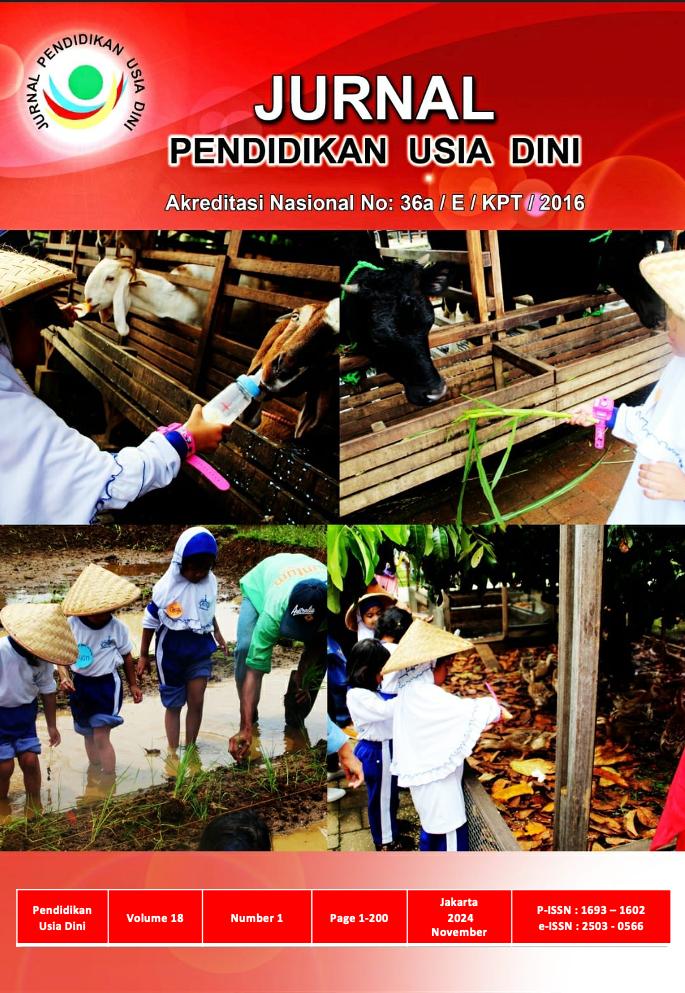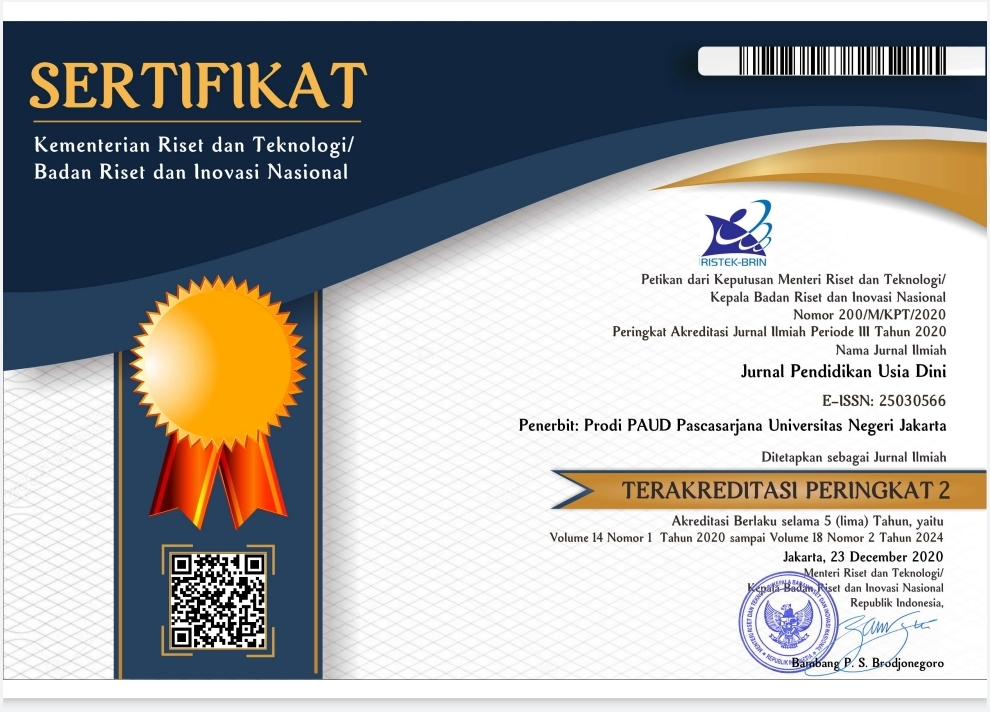Fostering Eco-literacy and Naturalistic Intelligence through Environmentally Based Education in Coastal Preschool
DOI:
https://doi.org/10.21009/JPUD.181.18Abstract
This research aims to analyze environmental-based education to increase environmental literacy and naturalistic intelligence. This research uses a qualitative descriptive method with interviews, observation, and document analysis as data collection techniques. Informants were selected using purposive sampling techniques. The criteria for selecting informants are teachers who have a minimum of five years of teaching experience and the ability to make environment-based learning plans. The sampling results were 15 teachers from five kindergartens in the coastal area. The research results show that Environment-Based Education (EBE) can increase children's eco-literacy and naturalistic intelligence which focuses on four main dimensions, such as knowledge, understanding, skills, values , and attitudes. Increasing children's positive attitudes and behavior towards the environment can increase awareness of coastal environmental preservation. Results also show increased acquisition of practical knowledge, skills, and positive attitudes towards the preservation and sustainability of the coastal environment. The findings of the above studies allow recommendations for understanding the long-term impact of such teaching on environmental literacy in children that requires long-term studies. A more organized learning model that other educational institutions may employ, and includes the creation of unique curricula, including outdoor education programs, and efforts in environmental initiatives.
Keywords: eco-literacy, naturalistic intelligence, environmental-based education, coastal ECCE
References:
Alfianto, A. B., Karyanto, P., & Harlita. (2019). Learning management system for eco literacy enhancement: The effectiveness of adopting Lewinshon indicators as an additional standard of competence. AIP Conference Proceedings, 2194. https://doi.org/10.1063/1.5139734
Amalric, M., & Cantlon, J. F. (2023). Entropy, complexity, and maturity in children’s neural responses to naturalistic video lessons. Cortex, 163, 14–25. https://doi.org/10.1016/j.cortex.2023.02.008
Anjari, T. Y., & Purwanta, E. (2019). Effectiveness of the Application of Discovery Learning to the Naturalist Intelligence of Children About the Natural Environment in Children Aged 5-6 Years. 296(Icsie 2018), 356–359. https://doi.org/10.2991/icsie-18.2019.65
Bater, M. L., Gould, J. F., Collins, C. T., Anderson, P. J., & Stark, M. J. (2024). Child development education in the Neonatal Unit: Understanding parent developmental literacy needs, priorities and preferences. Patient Education and Counseling,119(November 2023), 108058. https://doi.org/10.1016/j.pec.2023.108058
Biber, K., Cankorur, H., Güler, R. S., & Demir, E. (2023). Investigation of environmental awareness and attitudes of children attending nature centred private kindergartens and public kindergartens. Australian Journal of Environmental Education, 39(1), 4–16. https://doi.org/10.1017/aee.2022.1
Collado, S., Rosa, C. D., & Corraliza, J. A. (2020). The effect of a nature-based environmental education program on children’s environmental attitudes and behaviors: A randomized experiment with primary schools. Sustainability (Switzerland), 12(17). https://doi.org/10.3390/SU12176817
Ernst, J., & Burcak, F. (2019). Young children’s contributions to sustainability: The influence of nature play on curiosity, executive function skills, creative thinking, and resilience. Sustainability (Switzerland), 11(15). https://doi.org/10.3390/su11154212
Flanagan, R. M., & Symonds, J. E. (2022). Children’s self-talk in naturalistic classroom settings in middle childhood: A systematic literature review. Educational Research Review, 35(December 2021). https://doi.org/10.1016/j.edurev.2022.100432
Gauvain, M. (2020). Vygotsky’s Sociocultural Theory. Encyclopedia of Infant and Early Childhood Development, November 2018, 446–454. https://doi.org/10.1016/B978-0-12-809324-5.23569-4
Giorgi, R., & Mariotti, G. (2019). WebriSC-V: A web-based education-oriented RISC-V pipeline simulation environment. Proceedings of the Workshop on Computer Architecture Education, WCAE 2019. https://doi.org/10.1145/3338698.3338894
Hermawan, I. M. S., Arjaya, I. B. A., & Diarta, I. M. (2022). Be-Raise: a Blended-Learning Model Based on Balinese Local Culture To Enhance Student’S Environmental Literacy. Jurnal Pendidikan IPA Indonesia, 11(4), 552–566. https://doi.org/10.15294/jpii.v11i4.39475
Hilmi, M. I., Lutfiansyach, D. Y., Hufad, A., Kamil, M., & Wahyudin, U. (2020). Eco-Literacy: Fostering Community Behavior Caring for the Environment. The First Transnational Webinar on Adult and Continuing, 548(Traced 2020), 118–121.
Hong, S., & Lee, J. Y. (2022). Evaluation of therapeutic communication education for nursing students based on constructivist learning environments: A systematic review. Nurse Education Today, 119(August), 105607. https://doi.org/10.1016/j.nedt.2022.105607
Hutton, J., Children, C., Dewitt, T. G., Children, C., Horowitz-kraus, T., & Children, C. (2021). Development of an Eco-Biodevelopmental Model of Emergent Literacy Before Kindergarten: A Review. May. https://doi.org/10.1001/jamapediatrics.2020.6709
Istiana, R., Rahmayanti, H., & Sumargo, B. (2021). Marine environmental education learning system recommendation model based on student needs analysis in Indonesian coastal areas. Cypriot Journal of Educational Sciences, 16(5), 2236–2247. https://doi.org/10.18844/cjes.v16i5.6305
Juhriati, I., Rachman, I., & Yayoi, K. (2021). The best practice of ecoliteracy based on social culture. IOP Conference Series: Earth and Environmental Science, 802(1). https://doi.org/10.1088/1755-1315/802/1/012012
Kadarisman, I., & Pursitasari, I. D. (2023). Eco-literacy in Science Learning: A Review and Bibliometric Analysis. Jurnal Pendidikan Indonesia Gemilang, 3(2), 134–148. https://doi.org/10.53889/jpig.v3i2.197
Kim, B. J., & Chung, J. B. (2023). Is safety education in the E-learning environment effective? Factors affecting the learning outcomes of online laboratory safety education. Safety Science, 168(May), 106306. https://doi.org/10.1016/j.ssci.2023.106306
Kofi, A., & Asemnor, F. (2024). Play-Based Pedagogy in Ghanaian Basic Schools : A Review of Related Literature. 18(3), 17–28. https://doi.org/10.9734/AJARR/2024/v18i3611
Kos, M., Jerman, J., Anžlovar, U., & Torkar, G. (2016). Preschool children’s understanding of pro-environmental behaviours: Is it too hard for them? International Journal of Environmental and Science Education, 11(12), 5554–5571.
Kumpulainen, K., Byman, J., Renlund, J., & Wong, C. C. (2020). Children’s augmented storying in, with and for nature. Education Sciences, 10(6). https://doi.org/10.3390/educsci10060149
López-Alcarria, A., Poza-Vilches, M. F., Pozo-Llorente, M. T., & Gutiérrez-Pérez, J. (2021). Water, waste material, and energy as key dimensions of sustainable management of early childhood eco-schools: An environmental literacy model based on teachers action-competencies (ELTAC). Water (Switzerland), 13(2). https://doi.org/10.3390/w13020145
MacQuarrie, S., Nugent, C., & Warden, C. (2015). Learning with nature and learning from others: nature as setting and resource for early childhood education. Journal of Adventure Education and Outdoor Learning, 15(1), 1–23. https://doi.org/10.1080/14729679.2013.841095
Mattiro, S., Nasrullah, N., & P, R. (2021). Potensi Ekowisata Pesisir Berbasis Kearifan Lokal. Jurnal Ilmiah Mandala Education, 7(2), 220–225. https://doi.org/10.58258/jime.v7i2.1996
Melash, V. D., & Varenychenko, A. B. (2020). Theoretical and Methodological Support of Training of Future Teachers of the New Ukrainian Primary School for the Formation of Environmental Culture. Zhytomyr Ivan Franko State University Journal. Рedagogical Sciences, 0(4(103)), 96–108. https://doi.org/10.35433/pedagogy.4(103).2020.96-108
Melis, C., Wold, P. A., Bjørgen, K., & Moe, B. (2020). Norwegian kindergarten children’s knowledge about the environmental component of sustainable development. Sustainability (Switzerland), 12(19), 1–16. https://doi.org/10.3390/su12198037
Mwambeo, H. M., Wambugu, L. N., & Nyonje, R. O. (2022). Community Empowerment, Sustainability of Forest Conservation Projects and the Moderating Influence of Monitoring and Evaluation Practices in Kenya. Interdisciplinary Journal of Rural and Community Studies, 4, 48–59. https://doi.org/10.38140/ijrcs-2022.vol4.05
Nagar, R., Quirk, H. D., & Anderson, P. L. (2023). User experiences of college students using mental health applications to improve self-care: Implications for improving engagement. Internet Interventions, 34(May), 100676. https://doi.org/10.1016/j.invent.2023.100676
Nattel, J., & Akullian, D. (2021). An argument for the naturalistic study of collective intelligence. The Lancet Planetary Health, 5(5), e247–e248. https://doi.org/10.1016/S2542-5196(21)00077-2
Ningtyas, L. D. (2019). Pengaruh Naturalistic Intelligence dan New Environmental Paradigm terhadap Environmental Sensitivity. IJEEM - Indonesian Journal of Environmental Education and Management, 4(2), 82–94. https://doi.org/10.21009/ijeem.042.01
Nurwidodo, N., Amin, M., Ibrohim, I., & Sueb, S. (2020). The role of eco-school program (Adiwiyata) towards environmental literacy of high school students. European Journal of Educational Research, 9(3), 1089–1103. https://doi.org/10.12973/EU-JER.9.3.1089
Park, A. T., Richardson, H., Tooley, U. A., McDermott, C. L., Boroshok, A. L., Ke, A., Leonard, J. A., Tisdall, M. D., Deater-Deckard, K., Edgar, J. C., & Mackey, A. P. (2022). Early stressful experiences are associated with reduced neural responses to naturalistic emotional and social content in children. Developmental Cognitive Neuroscience, 57(February), 101152. https://doi.org/10.1016/j.dcn.2022.101152
Pękala, J. L., & Wichrowska, K. (2022). Play and participation in preschool children’s project activities. Problemy Wczesnej Edukacji, 54(1), 88–96. https://doi.org/10.26881/pwe.2022.54.07
Pursitasari, I. D., Program, S. E., Rubini, B., Program, S. E., & Firdaus, F. Z. (2022). Cypriot Journal of Educational mote critical thinking skills. Cypriot Journal of Educational Sciences, 17(6), 2105–2116.
Puspitasari, R., & Khomarudin. (2020). Outdoor Learning as the Development of Eco Literacy Skills in Learning Social Studies in Secondary School. 458(Icssgt 2019), 281–289. https://doi.org/10.2991/assehr.k.200803.035
Putri, K. Y. S., Fathurahman, H., Safitri, D., & Sugiyanta, L. (2019). Journal of Social Studies Education Research Sosyal Bilgiler Eğitimi Araştırmaları Dergisi. Journal of Social Studies Education Research, 10(3), 364–386.
Rakhmawati, D., & Kawuryan, S. P. (2023). Development of Ecological Citizenship-Based Character Education Model to Improve Environmental Naturalistic Intelligence of Elementary School Students. 12. https://doi.org/10.30595/pssh.v12i.835
Sadiku, M. N. O., Ashaolu, T. J., & Musa, S. M. (2020). Naturalistic Intelligence. International Journal Of Scientific Advances, 1(1). https://doi.org/10.51542/ijscia.v1i1.1
Sakurai, R., & Uehara, T. (2020). Effectiveness of a marine conservation education program in Okayama, Japan. Conservation Science and Practice, 2(3), 1–13. https://doi.org/10.1111/csp2.167
Srinivasan, R., & Borkar, U. (2021). a Study of Pro-Environmental Behavior As a Component of Naturalistic Intelligence Amongst in-Service School Teachers. International Journal of Scientific Research, 1992, 25–29. https://doi.org/10.36106/ijsr/8324035
Suhirman, S., & Yusuf, Y. (2019). The effect of problem-based learning and naturalist intelligence on students’ understanding of environmental conservation. JPBI (Jurnal Pendidikan Biologi Indonesia), 5(3), 387–396. https://doi.org/10.22219/jpbi.v5i3.9817
Tamblyn, A., Sun, Y., May, T., Evangelou, M., Godsman, N., Blewitt, C., & Skouteris, H. (2023). How do physical or sensory early childhood education and care environment factors affect children’s social and emotional development? A systematic scoping review. Educational Research Review, 41(January 2022), 100555. https://doi.org/10.1016/j.edurev.2023.100555
Wahyuni, N., Maryani, E., & Kastolani, W. (2022). The contribution ecoliteracy in environmental care behavior students of state high school in the city of medan. IOP Conference Series: Earth and Environmental Science, 1089(1). https://doi.org/10.1088/1755-1315/1089/1/012058
Wang, X., Young, G. W., Plechatá, A., Mc Guckin, C., & Makransky, G. (2023). Utilizing virtual reality to assist social competence education and social support for children from under-represented backgrounds. Computers and Education, 201(April). https://doi.org/10.1016/j.compedu.2023.104815
Wirdianti, N., Komala, R., & Miarsyah, M. (2019). Naturalist intelligence and personality: An understanding students’ responsible environmental behavior. JPBI (Jurnal Pendidikan Biologi Indonesia), 5(2), 229–236. https://doi.org/10.22219/jpbi.v5i2.7193
Zhuang, J., & Sun, H. (2023). Impact of institutional environment on entrepreneurial intention: The moderating role of entrepreneurship education. International Journal of Management Education, 21(3), 100863. https://doi.org/10.1016/j.ijme.2023.100863
Downloads
Published
How to Cite
Issue
Section
License
JURNAL PENDIDIKAN USIA DINI work is licensed under a Creative Commons Attribution 4.0 International License. (http://creativecommons.org/licenses/by/4.0/)





